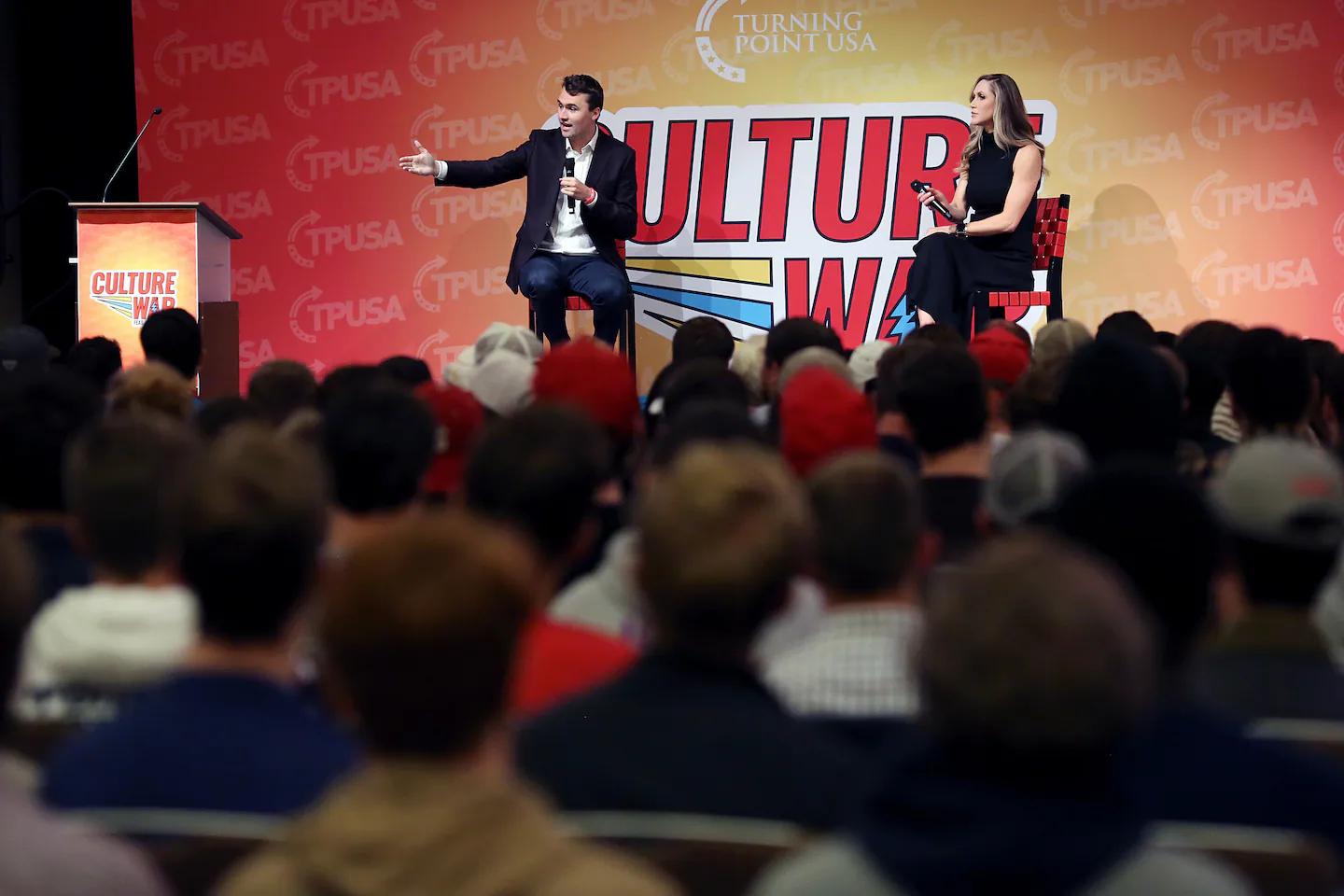
“He never thought of it as, ‘I’m going to go into the spiritual arena and talk about political things,’ ” she said. “He was, ‘I want to talk about spiritual things, and in order to do that, I have to enter the political arena.’ ”
That fusion of Christianity and politics reached a level Sunday in Arizona that Kirk could only have imagined that summer day years ago. He did not live to see it, after his assassination at age 31. But in a stadium full of mourners, including President Trump, Vice President JD Vance, House Speaker Mike Johnson, and tens of thousands of others, the success of his ideals of a politically active, conservative Christianity was omnipresent.
In death, Kirk’s faith, and its implication for America, is becoming more central than even in his life. His memorial service canonized him as the hero and motivational force of the new Christian right, a movement that Kirk himself both helped create and reflected.
Cabinet members and activists onstage Sunday repeatedly shared the Christian gospel message of salvation. Vance called him a “martyr for the Christian faith.” Trump said “he’s a martyr now for American freedom.” Those two, it appeared, were one and the same.
The event put on vivid display how Kirk’s personal spiritual story dovetailed with the broader story of American evangelicalism over the past decade, as Trump’s rise to power energized and empowered its followers while erasing walls between politics and religion.
As a child, Kirk went to a Presbyterian congregation. After the meeting at Starbucks, Korte invited him to visit her church, Harvest Bible Chapel in nearby Rolling Meadows, Ill., a large nondenominational evangelical congregation 15 minutes from his high school. James MacDonald, then a popular evangelical teacher, was the pastor.
One Sunday, Kirk showed up with a friend, Korte said.
“Someone had come up to me and said, ‘There’s a kid out here looking for a small group,’ ” said Landon MacDonald, the pastor’s son who led student ministries. “It was Charlie standing there.”
Kirk came to his discussion group for young men, where they would study the Bible and confess their sin. But he soon called to say he could not continue coming.
“He said, ‘Well, I’m starting this thing, it’s called Turning Point. And it’s going to be for conservatives on college campuses,’ ” Landon MacDonald said. “I was like, that’s amazing.”
Still, Kirk attended church regularly, soaking up James MacDonald’s sermons. He had prayed to accept Jesus as his personal savior around the fifth grade while a student at Heritage Christian Academy, started by Wayne Grudem, a conservative evangelical theologian. But like many evangelical teenagers entering young adulthood, he was figuring out his faith, during a time when President Obama highlighted a more progressive Christianity.
He developed his interest in apologetics, or making arguments to defend the Bible and religious beliefs. His method of biblical interpretation was often quite literal. “We have these answers, because our book, the holy word of God, is the same as today as it was 2,000 years ago,” he said once, seeing specific instruction on gender, immigration, and marriage.
At the time, Harvest was known as a Bible-teaching church, with a strong emphasis on preaching and discipleship, not politics. That approach was common in many evangelical churches before 2016, when congregations and the very fabric of American evangelicalism ripped in two over Trump’s rise to power.
James MacDonald was initially part of Trump’s evangelical advisory board but resigned after the “Access Hollywood” tape surfaced on which Trump could be heard speaking in vulgar terms about women. MacDonald called Trump “lecherous and worthless.” (Harvest fired MacDonald in 2019 for making what elders described as “highly inappropriate recorded comments.”)
When Kirk spoke at a 30th anniversary celebration for Harvest in 2018, as his fame and organization took off, he said he wanted to learn from Jesus’ example of not seeking political power or leading big rallies.
“He didn’t run for Caesar, he resisted any sort of recognition in earthly or human terms,” Kirk said. “He said, ‘I’m going to go pray in the garden, I’m going to go hang out with beggars.’”
But his political star rocketed as ’90s-style evangelicalism evolved into the more right-wing political Christianity of the Trump era.
In April 2019, Kirk approached Rob McCoy, a pastor who was on the City Council in Thousand Oaks, Calif. Kirk was curious about how McCoy entered politics while also in ministry. McCoy asked him if ever spoke in churches.
“Really, you’d have me? I’m not a preacher,” McCoy recalled Kirk saying.
The Sunday before his 26th birthday, Kirk took the stage at McCoy’s church, Godspeak Calvary Chapel. He preached against the spread of atheism and warned that universities were dangerous places that teach women false promises.
“Every Christian needs to get more engaged than you currently are,” he urged. “We are primed for another revival in this country.”
It was the beginning of a new phase of his mission. The pandemic, when pastors including McCoy defied church lockdowns, and Trump’s defeat in the 2020 election compelled Kirk to mobilize pastors to become involved in politics.
He founded TPUSA Faith, with McCoy as a co-chair, to influence Christians to “counter falsehoods and illuminate the inextricable link between faith and God-given liberty.” He hosted events at Dream City, a large evangelical megachurch in Arizona, and spoke out more vocally in personal terms about his own faith.
Some of Kirk’s beliefs reached across Christian traditions, just as changing political dynamics created new religious communities. Conservative evangelicals and Catholics, for example, formed a political cohort with more in common than some of their fellow congregants.
Terry Schilling, a Roman Catholic who is the president of American Principles Project, a social conservative advocacy group, said he remembered Kirk saying on his show that evangelicals had done a bad job honoring the Virgin Mary.
“With Catholics and Protestants there’s always a debate about Mary, and whether or not you should honor her,” Schilling said. “I texted him that day, and said thank you so much. He goes, ‘Mary’s the answer to feminism.’ ”
“I don’t really believe she is queen of heaven or sinless,” Schilling recalled Kirk saying, adding that he noted, “That’s just mysticism.”
Turning Point itself became a kind of modern church, as the political community he started grew into a religious one. It was more than a debate society or political organization, Vance said last week — if you were a young conservative or Christian, “Charlie’s Turning Point USA gave you a home.”
In a recent sermon, McCoy preached about how God had used Moses to bring the Israelites out of Egypt, and “to absolutely redefine their entire identity, like he’s done with this generation of young people.” Moses died, but God raised up Joshua to pick up the mantle for the next generation, he told them.
“You’ve lost a leader, but you’ve gained a movement,” McCoy said.



